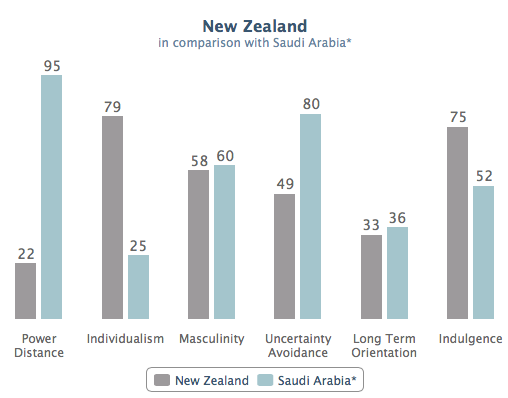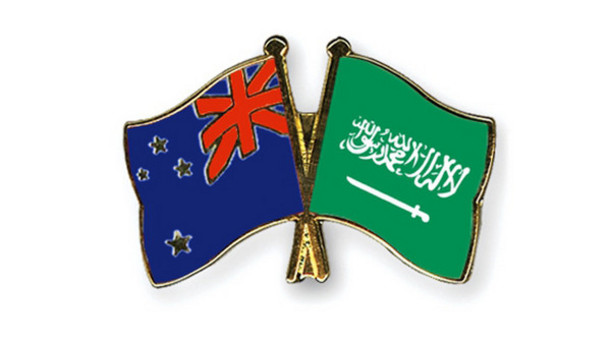The culture profile of Saudi Arabia is very different to that of New Zealand. This is why its important to realise the differences to effective sell my merino clothing in a foreign country. A simple way to compare some features of culture is to use the Hofstede culture comparison chart.

Power distance is a dimension dealing with the hierarchical nature of a country. Saudi Arabia has a score of 95 for this dimension meaning they accept that there is a hierarchical order in the country and this order does not need to be justified. This is almost the exact opposite to New Zealand as we Kiwi’s are very relaxed in terms of living in a non-hierarchical lifestyle. Any hierarchies that are established in NZ are usually in organisations and this is purely for convenience.
Individualism as a dimension describes the degree of independence a society has among its members. Individualistic societies tend to look after themselves and immediate families, which are seen in NZ. Kiwi’s are very independent which is probably a reason as to why we are referred to as Kiwis’ (a small, nocturnal, flightless bird that scavenges around by itself at night to feed its young). A collectivist society is where people belong to groups and take care of everyone in exchange for loyalty. This is seen in Saudi Arabia where loyalty is a strong aspect of the Saudi culture and often overrides rules in society. This relates back to the strict rules on women and is largely to do with the collectivism in within their culture.
Both New Zealand and Saudi Arabia are classed as masculine cultures. This is due to the fact that both countries are driven by competition, with success defined as being the best out of everyone. Both countries have strong work ethics engraved into their culture, which is reflective of the masculine dimension.
Uncertainty avoidance focuses on fear of the unknown, essentially not knowing what the future has to offer. Saudi Arabia score high on this dimension and because of this tend to stick to what they know to avoid any future problems. Innovation is avoided, as it does not follow the norm. NZ is neither similar nor different as they show they have no preference for this dimension.
Long term orientation is the way a country maintains links with the past as well as dealing with challenges of the present and future. Saudi Arabia is classed as normative for this dimension as they respect traditions and follow through with them however has a suspicion for societal change. NZ are also normative in this dimension. They typically don’t tend to save for the future and focus on achieving quick results, very much like Saudi Arabia.
Indulgence is the “extent to which people try to control desires and impulses”. Saudi Arabia does not have a clear preference on the scale and therefore are neither indulgent nor restrained. NZ however is very much an indulgent society which means people generally give in to their desires/impulses and place a higher degree of importance on leisure time.
Saudi Arabia has taken their customs, values and traditions, which date back to 1932 and have adapted them to the modern world. This is similar to NZ and its Maori culture in the sense that values and traditions have been held onto since 1642. However, Maori culture is slowly fading out of NZ society and instead various other cultures have had an impact on the current culture established in NZ today. Saudi Arabia’s culture has had minimal influences from other cultures and has predominantly been shaped by Islamic heritage.
The beginning of the Muslim era has been estimated to take place in the year AD 622. This year was significant for the flight of the Prophet Muhammad from his hometown of Mecca to Medina where he organised his followers before launching a successful campaign to recapture Mecca. This significant event has formed the event Hajj.
Saudi traditions are taught from a young age both in school and from family. Islamic teachings and Arab customs are also supported in these traditions. There are many cultural highlights throughout the year, some of these being Ramadan and Hajj. Ramadan is a holy month where Muslims fast from dusk to dawn, essentially being a month spent for purifying the soul. Hajj season is where Muslims from around the world come to Mecca, which is the birthplace of the Prophet Muhammad. Both these cultural events are very significant to Saudi Arabia and don’t really compare to anything of that in New Zealand.
From Hofstede’s culture comparison chart it is easy to see the cultural differences between both countries. On the scale of things, NZ and Saudi Arabia are not hugely different excluding the power distance and individualistic dimensions. Despite the small differences on the Hofstede comparison chart, I believe I will still find it a huge culture shock entering into Saudi Arabia, especially considering I come from no religious background.
In that case I best do my research!

To read more about Hofstede’s culture comparison chart between Saudi Arabia and NZ and Saudi Arabia’s extensive cultural background, click on these links.
https://geert-hofstede.com/new-zealand.html
http://www.worldtravelguide.net/saudi-arabia/history-language-culture
https://www.saudiembassy.net/about/country-information/culture_art/
